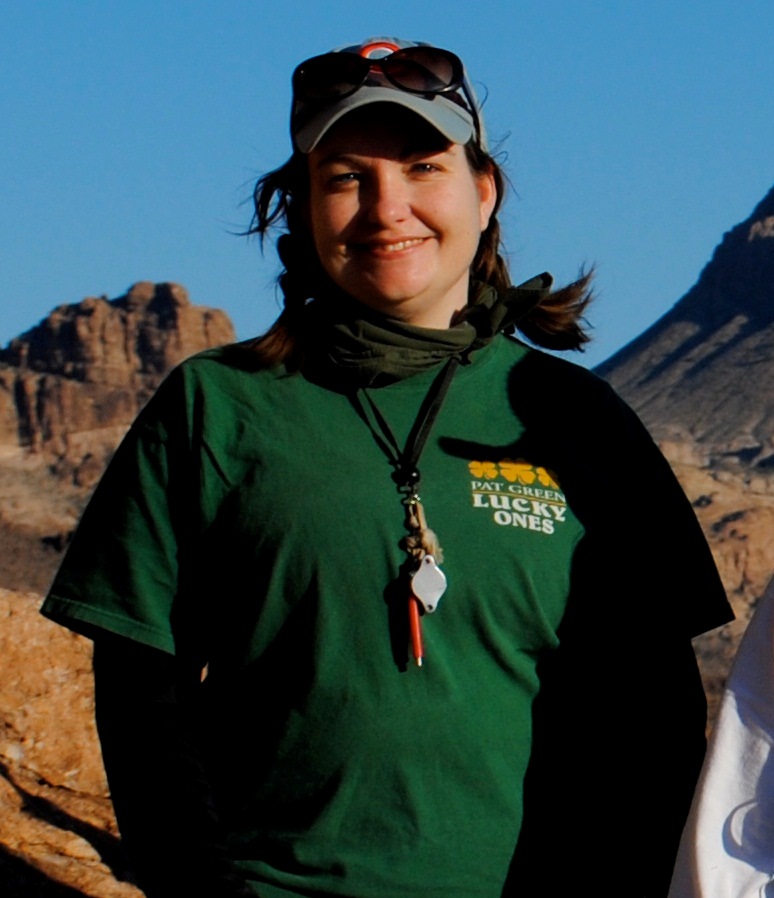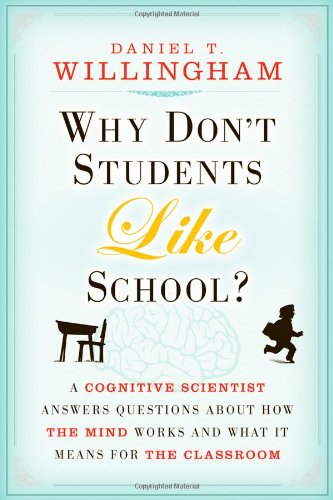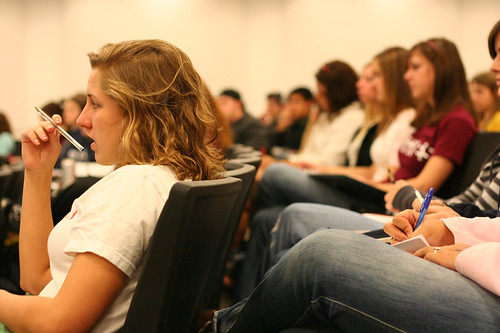In this issue
CFT BLOG
Check out these recent posts to our blog.
Trickle Up
First Person Singular
Reflections from SoTL Scholar Abbey Mann
The Mindful PhD: Sitting Down & Staying Still
Follow Us!
 
Follow the CFT on Facebook
and Twitter!
Get the latest information about events, resources, and news from the CFT on Facebook and Twitter. You can “like" our Facebook page, which means that the latest CFT news will appear in your Facebook news feed. You can also “follow” the CFT on Twitter to read the latest news. (If you’re not using Twitter, here’s a three-minute video that explains why you might want to.)
Subscribe
Not a member of the CFT News and Events LISTSERV? Subscribe now to receive future newsletters.
Archives
|
December 2014
From the Director
 The Center for Teaching is taking on a significant new role in the educational technology landscape at Vanderbilt. Starting this spring, the CFT will coordinate and provide technical and pedagogical support for Blackboard, Vanderbilt’s course management system, known locally as OAK. Also, in conjunction with Vice Provost for Learning and Undergraduate Affairs Cynthia Cyrus and the OAK Faculty Advisory Committee, the CFT will lead strategic planning for Blackboard and other potential platforms for supporting teaching and learning at Vanderbilt. The Center for Teaching is taking on a significant new role in the educational technology landscape at Vanderbilt. Starting this spring, the CFT will coordinate and provide technical and pedagogical support for Blackboard, Vanderbilt’s course management system, known locally as OAK. Also, in conjunction with Vice Provost for Learning and Undergraduate Affairs Cynthia Cyrus and the OAK Faculty Advisory Committee, the CFT will lead strategic planning for Blackboard and other potential platforms for supporting teaching and learning at Vanderbilt.
New roles often require new resources, and the CFT is now accepting applications for an Assistant Director for Educational Technology. This new colleague will work with current CFT staff to help Vanderbilt instructors understand the roles Blackboard and other platforms can play in teaching and learning. See the full Assistant Director for Educational Technology job description for more information. We anticipate hiring additional staff in 2015, which will allow the CFT to centralize Blackboard support across most of campus. This new model, with multiple Blackboard specialists housed at the CFT, should provide more robust support for Vanderbilt instructors.
The roadmap for Vanderbilt’s course management system looks promising. In late December, OAK/Blackboard will move from Vanderbilt servers to Blackboard servers, which should improve performance and reliability. Faculty who find OAK useful but slow should look forward to their Blackboard experience in January. Next summer, we plan to upgrade to a newer version of Blackboard, which will likely have an improved user interface and new tools for instructors. This spring, the CFT will seek input from Vanderbilt faculty, staff, and students to guide upgrade decisions. Faculty who have stopped using OAK because it didn’t meet their needs are especially invited to participate in this process and to try out the new Blackboard late next summer.
See my recent blog post for more details about the CFT’s new roles with Blackboard and related plans for enhancing educational technology resources for Vanderbilt instructors.
Derek Bruff, CFT Director
Back to top

Junior Faculty Teaching Fellow Spotlight: Lily Claiborne
Each month, the CFT Newsletter highlights the work of our Junior Faculty Teaching Fellows. This month, Lily Claiborne, Senior Lecturer in the department of Earth and Environmental Sciences, talks about her teaching philosophy and interests:
In a time when earth processes are moving to the forefront of global issues through climate change and natural resource management, it is important to me that I prepare future scientists and contribute to a scientifically literate citizenry. It’s good that this is my goal, since the courses that I currently teach are dominated by novices in the field (non-science majors, many of whom have significant science anxiety), but also contain students who will be Earth and Environmental Science majors. While these two groups bring very different levels of confidence, background knowledge and motivation to the classroom, my learning goals for them are the same. These goals revolve around building scientific skills which are transferable across disciplines (particularly making observations, asking questions, and figuring out how to answer those questions), developing an understanding of the Earth and its process, and guiding students toward a curiosity not just for scientific fact, but for how we know what we know.
 "The learning environment that evolves when people are taken out of the traditional classroom setting is incomparable, and I consider this one of my most valuable teaching tools. Field experiences inherently foster curiosity, enhance student-teacher and student-student relationships and communities, and build confidence in students regarding their knowledge and their skills through application. " "The learning environment that evolves when people are taken out of the traditional classroom setting is incomparable, and I consider this one of my most valuable teaching tools. Field experiences inherently foster curiosity, enhance student-teacher and student-student relationships and communities, and build confidence in students regarding their knowledge and their skills through application. "
When I go into an introductory level classroom, first and foremost on my mind are convincing the students that geology is related to their lives and nurturing their inherent curiosity about the natural world. I often hear students in my classes claim, “I’m not a science person.” I don’t let them say it! In order to really engage them, I have to combat this fairly pervasive science anxiety and their own low expectations of themselves in science.
I ask students to engage with neuroscience research that supports the idea of a growth mindset to help them begin to believe that they can learn anything with work and practice. Scaffolding, student choice, and formative assessment also go a long way toward this end. However, they often still perceive a wall between themselves and “scientists.” To address this, I have them step into the shoes of scientists whenever I can. I present them with data and ask them what it means. They monitor live data online (stream water flow, earthquakes, volcanic activity), and report on it to their classmates or make predictions about future behavior of the system. I tell stories of scientists figuring things out, from the perspective of humans puzzling through something. Real science is messy but beautiful, and I find that revealing this brings the process to a level with which the students are much more comfortable.
Finally… to my favorite part. I’ll admit it. I am a geology teacher because I love field trips. The learning environment that evolves when people are taken out of the traditional classroom setting is incomparable, and I consider this one of my most valuable teaching tools. Field experiences inherently foster curiosity, enhance student-teacher and student-student relationships and communities, and build confidence in students regarding their knowledge and their skills through application. Whether due to the breakdown of traditional roles, the camaraderie that develops, or the spontaneity and shared experiential learning that is inherent to actually getting out and looking at the earth together, time in the field leads to cooperative and deep learning in a way impossible to generate in the classroom. I work to create field experiences that result in student groups who motivate each other to excel, and I would argue, as much as interest in the subject, often lead students to continue their studies in the field.
Back to top

SoTL Scholars Program is Accepting Applications
 The SoTL Scholars Program introduces participants to the principles and practices of the Scholarship of Teaching and Learning, an international, multidisciplinary field of disciplinary specialists studying student learning. SoTL is a synthesis of teaching, learning, and research in higher education that aims to bring a scholarly lens—the curiosity, the inquiry, the rigor, the disciplinary variety—to what happens in the classroom. SoTL asks expert disciplinary researchers to apply and extend those skills into the classroom. For more explanation of SoTL, see the CFT’s SoTL Guide, which serves as the e-textbook for the Program. The program has two sequential parts, each of which is highly collaborative: The SoTL Scholars Program introduces participants to the principles and practices of the Scholarship of Teaching and Learning, an international, multidisciplinary field of disciplinary specialists studying student learning. SoTL is a synthesis of teaching, learning, and research in higher education that aims to bring a scholarly lens—the curiosity, the inquiry, the rigor, the disciplinary variety—to what happens in the classroom. SoTL asks expert disciplinary researchers to apply and extend those skills into the classroom. For more explanation of SoTL, see the CFT’s SoTL Guide, which serves as the e-textbook for the Program. The program has two sequential parts, each of which is highly collaborative:
- a one-semester SoTL Seminar to explore the fundamentals of the scholarship of teaching and learning, including its major thinkers and texts, its key concepts and language, and its relationship to older forms of classroom research, and to ask meaningful questions about student learning and its relationship to teaching. (Spring semester: 8 sessions, 75 minutes each)
- a one-semester SoTL Practicum to develop and carry out a SoTL project (documented in either the first eight pages of a publishable SoTL paper or a 20-minute presentation of the project, ready for submission to a SoTL conference) and gain the skills for presenting the project in scholarly public forums, including relevant conference presentations and publications. (Fall semester)
Participants may sign up for the Seminar only, but only those who complete the Seminar and Practicum will receive a Certificate in the Scholarship of Teaching and Learning. Participants who complete the certificate will have the first eight-pages of a publishable SoTL article, a twenty-minute SoTL conference presentation, or a SoTL conference poster.
The SoTL Scholars Program is co-directed by Nancy Chick (CFT Assistant Director, who brings years of SoTL experience and expertise, including founding and editing a major SoTL journal) and Vivian Finch, CFT Graduate Teaching Fellow who has completed the Program.
Application Deadline: December 22
Spring 2015 Seminar: Jan 8 - Feb 26, 3:30-4:45 at the CFT
For more details on the program or to apply, visit the SoTL Scholars webpage
Back to top

Interpreting and Making Sense of Course Evaluations
As the semester draws to a close, our students are given the opportunity to provide us with potentially valuable feedback on our teaching and its effects on their learning. You may find it challenging, however, to interpret what your end-of-semester course evaluations mean and decide how to act on them.
The CFT can help. A CFT consultant will be glad to meet with you in a one-on-one, confidential consultation to assist you with interpretation and response. Questions considered include:
- How do the evaluations indicate what we did well, and what we can change to improve student learning?
- What best practices may help us revise and refine our courses?
- What is the best way to reflect on our evaluations as we ready ourselves for professional review?
To make an appointment, use our contact form or call 322-7290. And for more information see our online Guide on Student Evaluations.
Back to top

From the Stacks...
Why Don't Students Like School?: A Cognitive Scientist Answers Questions About How the Mind Works and What It Means for the Classroom
by Daniel T. Willingham
Faculty will learn the importance of story, emotion, memory, context and routine in building knowledge and creating lasting learning experiences in this book by Daniel Willingham. This books helps to bridge the gap between cognitive research findings and practice through easy-to-apply, scientifically-based approaches for engaging students in the classroom. The author focuses nine fundamental principles of learning that do not change as circumstances change, and the surprising implications they have for teaching.
Available in the Center for Teaching library.
Back to top |


 The Center for Teaching is taking on a significant new role in the educational technology landscape at Vanderbilt. Starting this spring, the CFT will coordinate and provide technical and pedagogical support for Blackboard, Vanderbilt’s course management system, known locally as OAK. Also, in conjunction with Vice Provost for Learning and Undergraduate Affairs Cynthia Cyrus and the OAK Faculty Advisory Committee, the CFT will lead strategic planning for Blackboard and other potential platforms for supporting teaching and learning at Vanderbilt.
The Center for Teaching is taking on a significant new role in the educational technology landscape at Vanderbilt. Starting this spring, the CFT will coordinate and provide technical and pedagogical support for Blackboard, Vanderbilt’s course management system, known locally as OAK. Also, in conjunction with Vice Provost for Learning and Undergraduate Affairs Cynthia Cyrus and the OAK Faculty Advisory Committee, the CFT will lead strategic planning for Blackboard and other potential platforms for supporting teaching and learning at Vanderbilt. "The learning environment that evolves when people are taken out of the traditional classroom setting is incomparable, and I consider this one of my most valuable teaching tools. Field experiences inherently foster curiosity, enhance student-teacher and student-student relationships and communities, and build confidence in students regarding their knowledge and their skills through application. "
"The learning environment that evolves when people are taken out of the traditional classroom setting is incomparable, and I consider this one of my most valuable teaching tools. Field experiences inherently foster curiosity, enhance student-teacher and student-student relationships and communities, and build confidence in students regarding their knowledge and their skills through application. "
